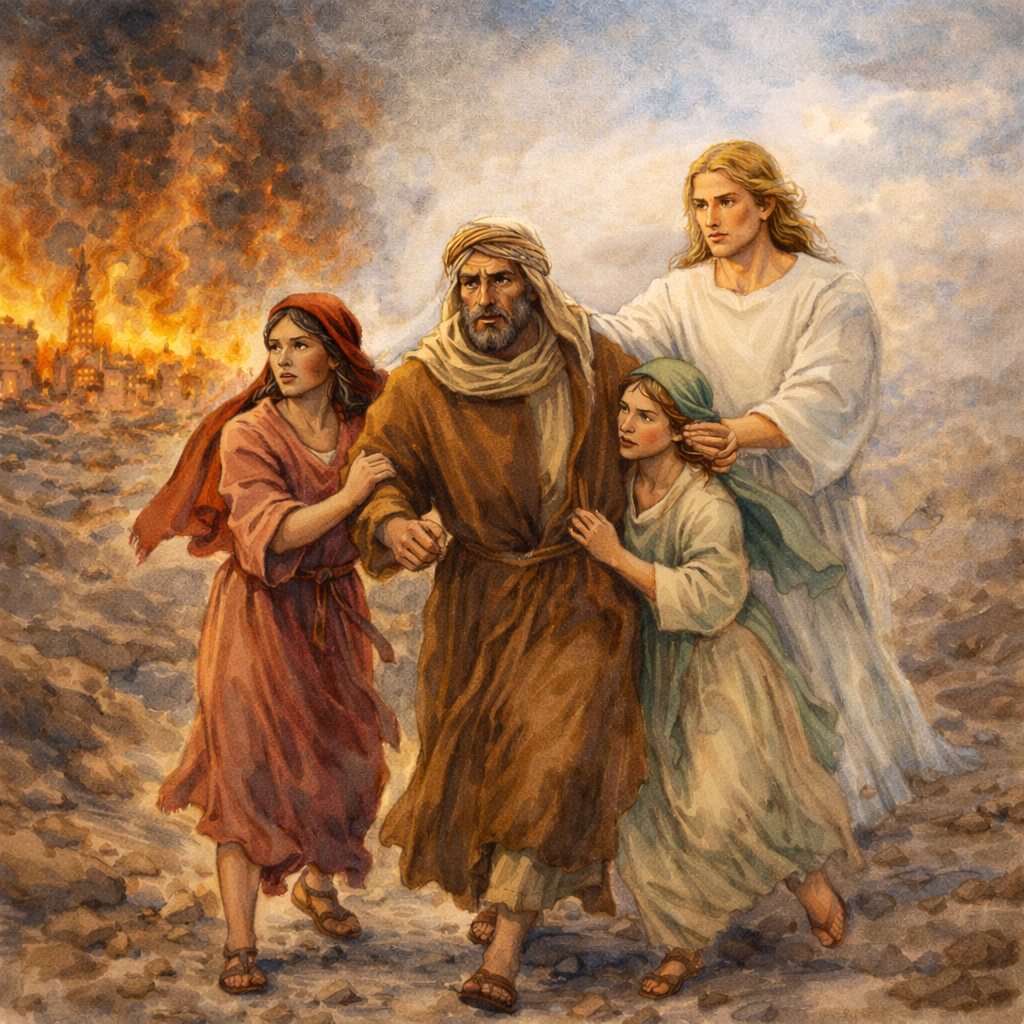Sodom and Gomorrah Destroyed
Angels Visit Abraham and Sarah
Angels visit Abraham and Sarah (Genesis 18)
This chapter tells of the visit of three messengers from God. Notice that, whereas three “men” (Genesis 18:2) came to Abraham, it is soon apparent that they were angels (Genesis 19:1; cp 18:17). We can picture the happy domestic scene as Abraham and Sarah show hospitality to their visitors. There is a lesson here for all who would follow their example (Hebrews 13:2).
These angels repeat to Abraham the message that he and Sarah would have a son. “Sarah laughed within herself saying, After I am waxed old shall I have pleasure, my lord being old also” (Genesis 18:12). To her it seemed impossible, and humanly speaking it was impossible (Genesis 18:11).
Peter, in referring to this incident, highlights the fact that Sarah called Abraham her “lord”, and makes the point that all true “daughters” of Sarah will likewise acknowledge their faithful husbands as their ‘lords’, being in submission to them (1 Peter 3:5–7). This God-given instruction is ridiculed by society today. This is partly because the ‘lordship’ that husbands are called upon to exhibit is not understood nor followed by them. It is not male domination, but a loving and caring protection and service for his wife, after the example demonstrated by the Lord Jesus Christ for his followers (Mark 10:42–45; John 13:13–15; Ephesians 5:22–29).
Although, for the moment Sarah doubted, the angel answered her saying, “Is anything too hard for the LORD?” (Genesis 18:14) In due time, according to the word of God, a son was born to Abraham and Sarah whom Abraham called Isaac (Genesis 21:1–7). Paul comments that “through faith Sarah received strength to conceive seed, and was delivered of a child when she was past age” (Hebrews 11:11–12).
God’s Judgement on Sodom and Gomorrah
The destruction of Sodom (Genesis 19)
After delivering their happy message to Abraham and Sarah, two of the angelic messengers continued their journey toward Sodom (Genesis 18:22; 19:1). One remained to warn Abraham of God’s impending judgment on Sodom and Gomorrah. Abraham was distressed because of Lot and his family and pleaded that God spare the righteous. “Wilt thou also destroy the righteous with the wicked?” (Genesis 18:23). The angel agreed that if there were ten righteous in the city then he would not destroy it (Genesis 18:23–33).
When the two angels arrived at Sodom, Lot prevailed upon them to take shelter and rest in his home. As we read through the account of the night’s activities we realise the utter wickedness of that city (Genesis 19:4–11), and understand why God’s judgments were to be poured out upon its inhabitants. The angels warned Lot to take his family from the city immediately. Lot pleaded with his family, but they would not listen (Genesis 19:12–14).
When morning came, the angels urged Lot, his wife and two daughters to flee the city, and told them not to look back. “Then the LORD rained upon Sodom and Gomorrah brimstone and fire from the LORD out of heaven” (Genesis 19:24). Lot’s wife looked back, for her heart was still with the people of that wicked city. So she was caught up in their fate and became a pillar of salt (Genesis 19:26). The destruction of those cities was absolute. It is believed that the geophysical destruction caused the depression of the Dead Sea and its sterile surrounds, and that Sodom and Gomorrah are now beneath the southern end of the Dead Sea.
The Lessons of Sodom’s Destruction
The lessons from the destruction of that wicked generation are referred to throughout the Bible.
Jesus Christ said that widespread base immorality similar to that of Sodom would be one of the signs indicating the nearness of his return (Luke 17:28–32). How accurately these words are being fulfilled before us today, with many governments legalising such depraved behaviour. He warned us to remember Lot’s wife and not have our hearts caught up with the pursuits of this evil world.
The apostle Peter used the example of God’s judgment upon Sodom as a guarantee that such ungodliness will not go unpunished (2 Peter 2:6–9; Jude 7).
The prophet Ezekiel in rebuking his people, paralleled the wicked state that had developed in Israel with the vile conduct of Sodom. He lists the sins of Sodom (Ezekiel 16:49–50).
Adapted from “The Exploring the Bible Course” by David Evans

